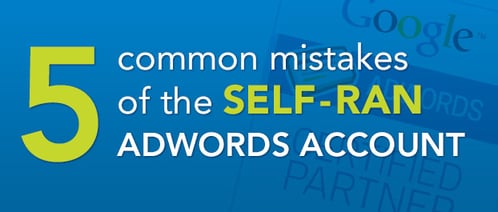5 Common Mistakes of the Self-Ran AdWords Account
 Pay-Per-Click (PPC) advertising is a common and effective way for businesses and companies to market themselves and their products online. A well-structured and optimized campaign boosts brand awareness and can bring in a steady flow of new potential customers. With the ability to control your budget and the short period needed to start seeing results, PPC is becoming a preferred marketing strategy for business owners. From local plumbers to large enterprises with global presence, PPC provides prominent online visibility and can be highly targeted to reach a specific audience.
Pay-Per-Click (PPC) advertising is a common and effective way for businesses and companies to market themselves and their products online. A well-structured and optimized campaign boosts brand awareness and can bring in a steady flow of new potential customers. With the ability to control your budget and the short period needed to start seeing results, PPC is becoming a preferred marketing strategy for business owners. From local plumbers to large enterprises with global presence, PPC provides prominent online visibility and can be highly targeted to reach a specific audience.
Although getting started with AdWords is made easy with Google’s platform, creating an effective campaign is another story. In addition to industry knowledge, it’s also necessary to understand how the average user searches for products or services and most importantly, the many intricacies and settings in AdWords. Not knowing these settings can result in a badly structured campaign that can eat up your budget and leave you with nothing to show for it.
If your campaign is steadily eating away at your marketing budget but giving you no results, it’s time to put the brakes on your campaign. If you are running your own AdWords campaign and are not getting any results, it may be time to hire a professional.
Here are five common mistakes made by amateurs when setting up and running an AdWords accounts.
Irrelevant Keywords
When it comes to attracting traffic online, it’s important that you start with solid keyword research to understand how potential customers may be looking for your services or your products online. Oftentimes, however, people get too carried away with keywords and end up choosing keywords that are too tangential to their business offerings. For example, a local florist (with no online shopping capabilities) may be tempted to add keywords such as “red roses,” “arranging flowers,” “flowers” or “Valentine’s Day” to their campaign. While they are indeed related, these keywords will most likely eat up the budget and have little to no results. Why? Someone searching for “red roses” may be looking to buy red roses online. A user searching for “arranging flowers” may be looking to learn how to arrange their own flowers. A very broad keyword such as “flowers” and “Valentine’s Day” will be very costly and probably won’t end up giving good results.
Misuse of Match Types
After choosing wrong keywords, the next common mistake made by non-AdWords experts is not utilizing the correct match types. AdWords allows for keyword matching including, broad, broad match modifier, phrase, exact. Most of the time inexperienced AdWords users will set all their keywords as broad match, the default option. Using broad match for all keywords can be a very costly mistake. Essentially broad match allows your ads to show up for just about any search query, many that are not relevant to your campaign. Take the keyword “basketball shoes.” Used as broad match, your ads may show up for searches such as “buy basketball shoes, playing basketball, basketball rules or basketball players.” If you sell basketball shoes online, you are not interested in the people clicking on your ad for queries such as “basketball players.” Keywords set in broad match tend to have a high search volume, meaning that you could potentially get a lot of clicks for nothing.
Bad Ad Copy and Relevancy
Another common mistake of self-ran AdWords campaigns is bad ad copy with little relevancy to the landing page. Creating ad copy is an art form. Trying to express the value of your offer and your products while differentiating yourself from competitors in a span of 25-30 characters is no easy feat. A big failure is not including a call-to-action. Regardless of your business, it’s important to let the users know what you are offering and what to expect once they click on your ad. Whether it’s a discount, free shipping or a free quote, it’s important to include a compelling and concise call-to-action to your ad copy. More than creating good ad copies, AdWords professionals can also amp up the visibility of your ads with site extensions for maximum visibility and more clicks.
Lack of Targeting & Scheduling
Yet another big (and costly) mistake is to not have any type of targeting in your campaign. AdWords is sophisticated enough to allow you to target your ads to people within blocks of your business during your business hours. Most self-ran campaigns have the entire country as the default setting and no time scheduling. This can have a great impact on your budget and cause even more headaches. Local businesses should be very careful to target their campaigns by regions they can actually serve. For example, if you’re a local pizza delivery shop in San Francisco, your range is probably within 5 miles of your location. Showing up in New York will not only waste money, but may end up in angry calls when users find your ad in other states.
Ineffective Landing Page
Perhaps the biggest oversight of any business owner trying to run his or her own AdWords campaign is not understanding the importance of the landing page. Getting people to click on your ad is one thing. Getting them to take the desired action requires strategic planning for maximum results. Most self-ran AdWords campaigns use the homepage of their website as the destination URL. While this may work in some instances, it all depends on what specific offer your ads promise and how well your website is designed to cater to that offer. If your ads promise a free sample offer and the user clicks on your ad only to find themselves on the homepage of your website looking for the free sample offer, you’ve probably wasted your time and money. Moreover, you have frustrated a user. Depending on how well-designed your website was for conversions, most AdWords professionals will suggest an exclusive landing page that speaks to the service and offer you are promoting.
Running your own PPC campaign in AdWords can boost your business’s online visibility and bring in new clients. However, creating, structuring and optimizing an effective PPC campaign takes time and in-depth knowledge of the AdWords advertising platform. If you know you’ve made these mistakes, it may be time to contact pay-per-click management company to review your AdWords campaign and prevent you from wasting your hard-earned marketing budget!


